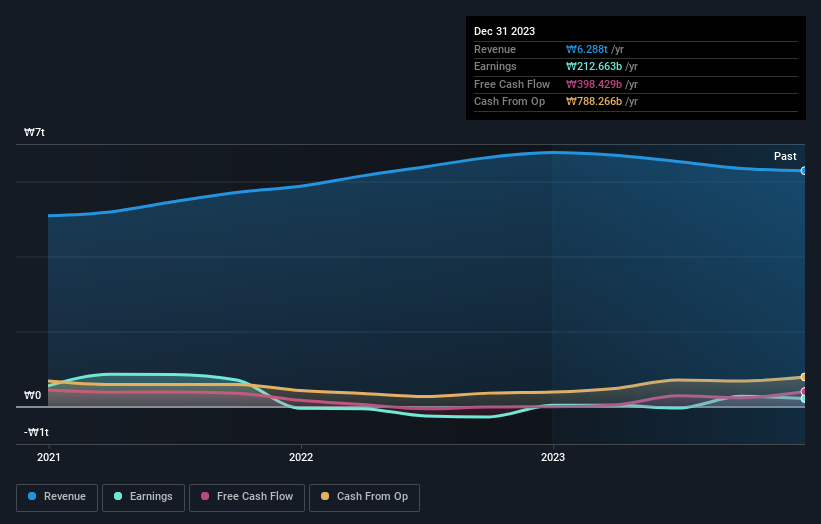Stock Analysis
- South Korea
- /
- Chemicals
- /
- KOSE:A002380
KCC Corporation (KRX:002380) CEO Mong-Jin Chung's holdings dropped 7.6% in value as a result of the recent pullback

Key Insights
- Insiders appear to have a vested interest in KCC's growth, as seen by their sizeable ownership
- A total of 4 investors have a majority stake in the company with 50% ownership
- Institutions own 24% of KCC
If you want to know who really controls KCC Corporation (KRX:002380), then you'll have to look at the makeup of its share registry. With 40% stake, individual insiders possess the maximum shares in the company. In other words, the group stands to gain the most (or lose the most) from their investment into the company.
And following last week's 7.6% decline in share price, insiders suffered the most losses.
Let's delve deeper into each type of owner of KCC, beginning with the chart below.
Check out our latest analysis for KCC

What Does The Institutional Ownership Tell Us About KCC?
Institutional investors commonly compare their own returns to the returns of a commonly followed index. So they generally do consider buying larger companies that are included in the relevant benchmark index.
We can see that KCC does have institutional investors; and they hold a good portion of the company's stock. This suggests some credibility amongst professional investors. But we can't rely on that fact alone since institutions make bad investments sometimes, just like everyone does. It is not uncommon to see a big share price drop if two large institutional investors try to sell out of a stock at the same time. So it is worth checking the past earnings trajectory of KCC, (below). Of course, keep in mind that there are other factors to consider, too.

We note that hedge funds don't have a meaningful investment in KCC. Looking at our data, we can see that the largest shareholder is the CEO Mong-Jin Chung with 26% of shares outstanding. Meanwhile, the second and third largest shareholders, hold 11% and 7.6%, of the shares outstanding, respectively.
Our research also brought to light the fact that roughly 50% of the company is controlled by the top 4 shareholders suggesting that these owners wield significant influence on the business.
While it makes sense to study institutional ownership data for a company, it also makes sense to study analyst sentiments to know which way the wind is blowing. Our information suggests that there isn't any analyst coverage of the stock, so it is probably little known.
Insider Ownership Of KCC
While the precise definition of an insider can be subjective, almost everyone considers board members to be insiders. Management ultimately answers to the board. However, it is not uncommon for managers to be executive board members, especially if they are a founder or the CEO.
I generally consider insider ownership to be a good thing. However, on some occasions it makes it more difficult for other shareholders to hold the board accountable for decisions.
It seems insiders own a significant proportion of KCC Corporation. It is very interesting to see that insiders have a meaningful ₩686b stake in this ₩1.7t business. It is good to see this level of investment. You can check here to see if those insiders have been buying recently.
General Public Ownership
The general public-- including retail investors -- own 36% stake in the company, and hence can't easily be ignored. While this group can't necessarily call the shots, it can certainly have a real influence on how the company is run.
Next Steps:
It's always worth thinking about the different groups who own shares in a company. But to understand KCC better, we need to consider many other factors. Like risks, for instance. Every company has them, and we've spotted 2 warning signs for KCC (of which 1 is a bit concerning!) you should know about.
Of course this may not be the best stock to buy. So take a peek at this free free list of interesting companies.
NB: Figures in this article are calculated using data from the last twelve months, which refer to the 12-month period ending on the last date of the month the financial statement is dated. This may not be consistent with full year annual report figures.
Valuation is complex, but we're helping make it simple.
Find out whether KCC is potentially over or undervalued by checking out our comprehensive analysis, which includes fair value estimates, risks and warnings, dividends, insider transactions and financial health.
View the Free AnalysisHave feedback on this article? Concerned about the content? Get in touch with us directly. Alternatively, email editorial-team (at) simplywallst.com.
This article by Simply Wall St is general in nature. We provide commentary based on historical data and analyst forecasts only using an unbiased methodology and our articles are not intended to be financial advice. It does not constitute a recommendation to buy or sell any stock, and does not take account of your objectives, or your financial situation. We aim to bring you long-term focused analysis driven by fundamental data. Note that our analysis may not factor in the latest price-sensitive company announcements or qualitative material. Simply Wall St has no position in any stocks mentioned.

Simply Wall St
About KOSE:A002380
KCC
KCC Corporation provides building materials in South Korea and internationally.
Proven track record average dividend payer.
